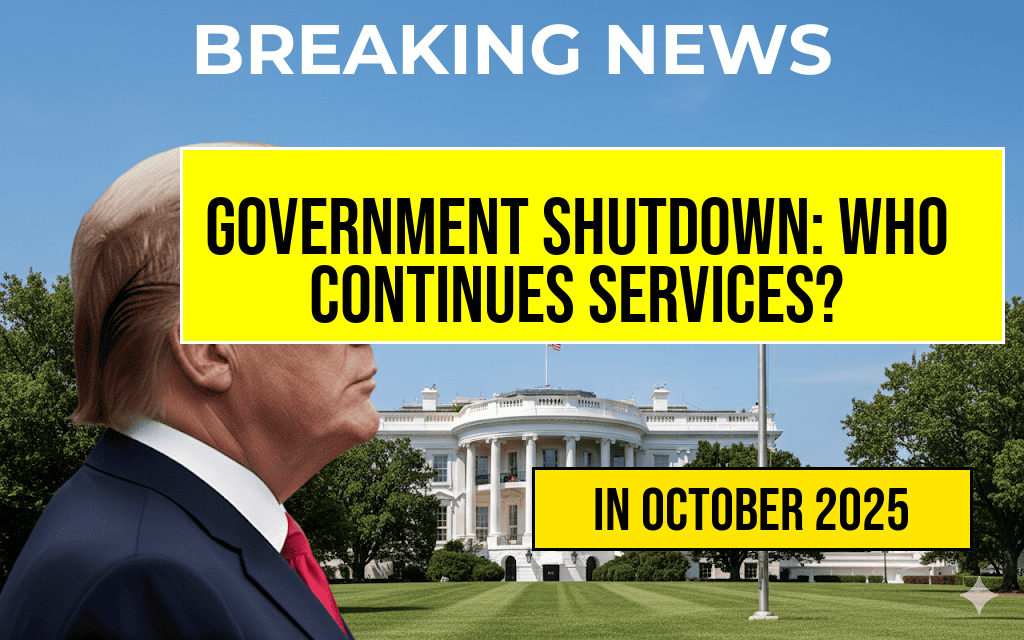The United States government has officially commenced a shutdown after Congress failed to pass a comprehensive funding bill before the fiscal deadline. As a result, a significant number of federal agencies and programs are halting non-essential operations, while others continue to serve the public under specific mandates. This shutdown impacts millions of Americans who rely on social services, security, and transportation, raising questions about the scope and duration of disruptions across various sectors. While some agencies are able to maintain critical functions, many others are furloughing employees and suspending services until funding is restored. This article provides a detailed agency-by-agency breakdown, clarifying which operations are ongoing and which have been curtailed amid the funding lapse.
Overview of the Federal Shutdown Impact
The shutdown was triggered after congressional leaders and the White House failed to reach an agreement on funding legislation, leading to a lapse in appropriations. During a government shutdown, agencies generally operate under a set of guidelines that prioritize essential functions, often defined by law. The key concern for the public revolves around disruptions to services such as Social Security, tax processing, national security, and transportation security. The extent of these disruptions varies significantly depending on each agency’s statutory obligations and available contingency funds.
Agencies Continuing Operations During the Shutdown
Social Security Administration (SSA)
- Operations: Continues processing Social Security benefits, including retirement, disability, and survivor benefits.
- Staffing: Most frontline employees remain on duty, ensuring beneficiaries receive payments on schedule.
- Limitations: Some administrative functions, such as in-person services and certain claims processing, may experience delays.
According to the SSA, approximately 66 million Americans depend on social security payments. The agency maintains core operations to prevent disruptions to benefit delivery, although some customer service functions are scaled back.
Internal Revenue Service (IRS)
- Operations: Continues processing tax refunds and essential tax collection activities.
- Staffing: Limited personnel remain to handle critical functions, including fraud detection and debt collection.
- Limitations: Most taxpayer assistance centers are closed, and non-critical correspondence and audits are delayed.
The IRS emphasizes that taxpayers should still file returns, but some services, such as live help and in-person assistance, are temporarily unavailable. For more information, visit the [IRS official website](https://www.irs.gov/).
Defense Department
| Function | Status |
|---|---|
| Active military operations | Continued as normal |
| Non-essential personnel | Furloughed |
| Administrative functions | Limited, with essential staff retained |
While active military duties and national security activities proceed uninterrupted, many administrative and support services are temporarily suspended or scaled back. Contractors working on critical projects continue operations under contract provisions.
Transportation Security Administration (TSA)
- Operations: Maintains full staffing at airports nationwide, ensuring continued passenger screening and security checks.
- Funding: TSA personnel are deemed essential, allowing airports to operate normally.
- Limitations: Administrative and administrative support functions may experience delays.
The TSA’s primary security functions are unaffected, preventing disruptions at airports and major transit hubs. This prioritization aims to minimize inconvenience to travelers during the shutdown period.
Agencies Facing Significant Disruptions
National Park Service (NPS)
- Operations: Most national parks and monuments are closed to visitors.
- Staffing: Furloughs are widespread; only a skeleton crew remains for maintenance and safety concerns.
- Impact: Visitor centers, restrooms, and park programs are shut down, affecting tourism and local economies.
Federal Courts and Legal Services
- Operations: Most federal courts suspend non-urgent proceedings, delaying trials and hearings.
- Clerk’s Offices: Limited staff are available for essential filings, but many services are unavailable.
Other Agencies
- Many smaller agencies and programs, including environmental oversight, scientific research, and grant administration, face closures or delays.
- Furloughs and service suspensions are common, with some critical functions maintained only if legally mandated.
Public and Economic Implications
The shutdown’s ripple effects extend beyond immediate agency disruptions. Federal contractors face delays in payments, and state and local governments may encounter increased burdens due to federal service lapses. Economists warn that prolonged shutdowns can slow economic growth, particularly if essential government functions like social security and defense remain operational while others are halted.
For ongoing updates and guidance, citizens are encouraged to monitor official agency websites and trusted news sources. The shutdown underscores the delicate balance between legislative priorities and the operational continuity of government services vital to millions of Americans.
Frequently Asked Questions
What services will continue during the government shutdown?
During the government shutdown, essential services such as Social Security, the IRS, Defense, and the Transportation Security Administration (TSA) will continue operations to ensure critical functions remain active.
Which federal agencies are affected by the shutdown and which are unaffected?
The shutdown impacts non-essential agencies and programs, leading to temporary closures or delays. However, agencies like the Social Security Administration, IRS, Defense, and TSA are classified as essential and will keep operating.
Will Social Security payments be affected during the shutdown?
No, Social Security payments will continue uninterrupted as they are considered essential services. Beneficiaries can expect their payments to be issued as usual.
How might the shutdown impact IRS operations and tax processing?
During the government shutdown, IRS services related to processing tax returns and refunds may be delayed. However, core functions necessary for taxpayer safety and compliance will remain active.
What should travelers expect at airports during the shutdown?
Travelers will still experience TSA security screenings and related airport operations, as the TSA is an essential agency. However, some non-essential federal services at airports may be temporarily reduced.






